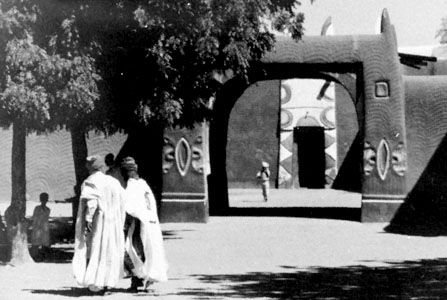Our episode today gives an abridged summary of the history of our setting: Kasar Hausa. Located in modern day Northern Nigeria, as well as parts of Cameroon, Chad, and Niger, Kasar Hausa is the traditional homeland of the Hausa people.
The origins of the Hausa people are steeped in a complex web of mythology and history. Traditional Hausa historians and laypeople often credit the Epic of Bayajidda as telling the origin of the Hausa people. According to the epic legend, the ancestors of the Hausa had recently settled in the territory of Daura, and were terrorized by the great serpent Sarki, who refused to let them drink from the well without his permission. An exiled Arab prince named Abu Yazid rode into town one day, slew the beast, and married the queen. The queen at first refused to sleep with Abu Yazid, and instead gave him a slave girl to fulfill his sexual needs. However, Yazid's concubine made it clear that she sought for her son to become the next king of Daura, the queen understood that her position was in danger, and decided to sleep with Yazid. Yazid's son with the queen would become the ancestor of all future Hausa monarchs, while the concubine's son became the ancestor of the Yoruba, Nupe, Gbari, Gungawa, and Ijaw nations, as well as the future Hausa kings of Kebbi and Zamfara.
 |
| A modern illustration of Abu Yazid (Bayajidda) slaying Sarki |
Nigerian and Western historians alike generally don't take the legend seriously as a source of history. At most, some will make a tenuous connection between the figure of Abu Yazid, and a north African Amazigh cleric who led a rebellion against the Fatimids in roughly the same time period. But even this connection is dubious. Rather, most academic historians believe the Hausa are descended from the Proto-Chadic people, the basal ancestor of the Chadic-speaking peoples of West Africa. Hausa culture also shows notable influence from two of its neighbors: the Kanuri people of modern Chad and the Amazigh people from much of northern and western Africa.
The Islamic faith was likely introduced into Kasar Hausa through a gradual process of cultural and mercantile exchange with North Africa and the Western Sahel. By the 14th Century, many of the Sarki of Hausa cities were at least nominally Muslim. Some, like the Sarki of Kano Yaji, proved to be incredibly dedicated to their faith, building mosques and fighting conflicts with local pagan nobility. Islam in Kasar Hausa, though, varied greatly in its practice. Many members of the Ulema, the Islamic religious class, practiced their faith along the orthodox guidelines laid out in the Qur'an and guided by scholarly writers of the Maliki school of jurisprudence. However, among commoners and nobles alike, Islamic practice was often quite nominal and syncretized, especially in the countryside.
The economic system of Kasar Hausa relied on a complex system of hierarchical taxation. The kings of major cities typically held major sway over nearby towns and villages, extracting tribute and tax money from local nobles. Meanwhile, wealthy private landholders sometimes collected revenue through the institution of the rinji, or slave village. The landowner hired an overseer to ensure that the residents of the rinji dedicated a portion of their labor towards subsistence farming to support their own caloric needs, and dedicate surplus labor to harvesting crops for commercial sale. The industry was highly lucrative, though not for the people doing the actual work.
 |
| Incomplete map of Kasar Hausa in the 16th Century |
Between the urban settlements of Kasar Hausa, the largely pastoral Fulbe people migrated their herds between grazing lands. The Fulbe, also known as the Fulani or Peul, migrated throughout many areas of Sahelian West Africa when their homeland in northern Senegal and southern Mauretania/Algeria became too dry to support their cattle and goat herds. Today, Fulbe live as a dispersed minority group throughout the entirety of the Sahel, from the Gambia and Senegal, to Nigeria, even as far as Sudan.
Like pastoral nomads throughout the world, Fulbe nomads played an important role in the economy of Kasar Hausa. Due to their frequent movements, Fulbe rarely set up permanent homes, typically relying instead on temporary shelters called Bukkaru. While moving between pastures, Fulbe often carried trade goods that they happened to pick up along the way. For many Fulbe, the potential profits in trading proved so valuable that some abandoned herding altogether in favor of working as full-time merchants. Additionally, the Fulbe had a relatively high penetration of Islamic practice compared to their neighbors. As a result, many local Islamic universities found great success recruiting among Fulbe populations.
 |
| A Fulbe man wearing traditional attire |
Like pastoral nomads throughout the world, Fulbe nomads played an important role in the economy of Kasar Hausa. Due to their frequent movements, Fulbe rarely set up permanent homes, typically relying instead on temporary shelters called Bukkaru. While moving between pastures, Fulbe often carried trade goods that they happened to pick up along the way. For many Fulbe, the potential profits in trading proved so valuable that some abandoned herding altogether in favor of working as full-time merchants. Additionally, the Fulbe had a relatively high penetration of Islamic practice compared to their neighbors. As a result, many local Islamic universities found great success recruiting among Fulbe populations.
 |
| A trio of Bukkaru, the temporary shelters designed to be easy for herdsmen to disassemble and rebuild while on the move. |
With the abridged introduction to life in pre-revolutionary Kasar Hausa complete, next episode we will begin our examination of the life of the central figure of the jihad: Shehu Usman Dan Fodio.


No comments:
Post a Comment